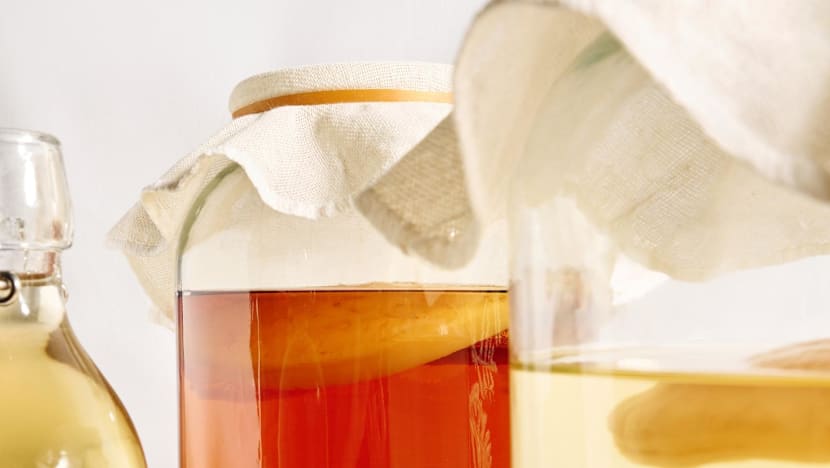Health
Experts Weigh Health Benefits of Kombucha Amid Limited Evidence

The popularity of kombucha, a fermented tea, has surged as many consumers tout its potential health benefits. However, experts caution that while some positive effects are possible, the scientific evidence remains limited.
Gabriela Fraiz, a doctoral student at the Federal University of Vicosa in Brazil, reported improvements in her gut health after incorporating kombucha into her daily routine. Since she began drinking the beverage, she has experienced less bloating and improved regularity. Fraiz brews her own kombucha, enjoying its “fizzy, slightly citrusy and sweet” flavor. Social media abounds with claims that kombucha can assist with weight loss, manage Type 2 diabetes, and reduce the risk of heart disease and cancer. Yet, as Fraiz noted, most of these assertions lack robust human research to support them.
Understanding Kombucha
Kombucha is created by fermenting tea and sugar with a symbiotic culture of bacteria and yeast, commonly referred to as a SCOBY. During fermentation, yeast converts sugar into alcohol and carbon dioxide, resulting in a fizzy drink. Subsequently, bacteria transform most of the alcohol into various acids, lending kombucha its distinctive vinegary flavor. The beverage contains caffeine, beneficial plant compounds known as polyphenols, and typically less than 0.5 percent alcohol in commercial varieties.
While kombucha is generally low in sugar, some brands add additional sugar or fruit juice to enhance sweetness. Heather Hallen-Adams, an associate professor at the University of Nebraska-Lincoln, emphasized the importance of checking ingredients, as some kombucha products can have over 10 grams of added sugars per serving. Most commercial kombucha retains live yeast and bacteria, although some are pasteurized or filtered for extended shelf life, according to Justin Sonnenburg, a professor of microbiology and immunology at Stanford University.
Health Benefits of Kombucha: What the Research Shows
Preliminary animal studies have suggested that kombucha may offer health advantages, such as reduced inflammation and improved blood sugar control. However, clinical trials involving humans are sparse and often yield inconclusive results.
In a 2024 randomized controlled trial involving approximately 60 participants with excess body weight, Fraiz and her colleagues found that those consuming around 200 milliliters (about 7 ounces) of kombucha daily for ten weeks did not experience significant weight loss compared to those who abstained from the beverage. Participants in the kombucha group reported less acid reflux, bloating, and fewer hard stools, yet changes in gut microbiota were minimal.
Another small trial from 2024 included 16 participants who drank two cups of kombucha each day for four weeks. This study showed no significant improvements in blood pressure, cholesterol, or inflammation levels compared to an eight-person control group. Additional studies indicated that kombucha might help regulate blood sugar levels. One 2023 trial involved 11 healthy adults consuming a meal along with different beverages on separate occasions. The results indicated that blood sugar responses were about 20 percent lower when kombucha was consumed.
Despite these promising findings, Dr. Dan Merenstein, a professor of family medicine at Georgetown University, cautioned that the studies are too small to draw definitive conclusions. He stated, “We don’t have enough high-quality research to say whether drinking kombucha alone is beneficial.”
Both Sonnenburg and Merenstein noted that while individual studies show potential, there is a growing body of evidence linking the consumption of various fermented foods—including yogurt, kefir, kimchi, and sauerkraut—with a healthier microbiome and reduced inflammation.
Experts advise moderation and caution regarding kombucha consumption. Sonnenburg suggests that a low-sugar kombucha can be a healthier alternative to sugary sodas or cocktails. When purchasing, consumers should look for products with minimal ingredients—primarily tea, sugar, and possibly some fruit juice, herbs, or spices.
For those interested in brewing their own kombucha, Hallen-Adams recommends sourcing a SCOBY from a reputable retailer and maintaining a clean brewing environment to avoid contamination. Homemade kombucha can be risky; isolated cases of severe illness, including liver injury and acidosis, have been linked to improperly brewed batches.
As the interest in kombucha continues to grow, ongoing research will be essential to clarify its health benefits and ensure safe consumption practices.
-

 World5 months ago
World5 months agoSouth Korea’s Foreign Minister Cho Hyun to Visit China This Week
-

 Business5 months ago
Business5 months agoStarling Bank Plans Secondary Share Sale, Targeting $5.4 Billion Valuation
-

 Top Stories5 months ago
Top Stories5 months agoMunsang College Celebrates 100 Years with Grand Ceremony
-

 World5 months ago
World5 months agoPAS Aims to Expand Parliamentary Influence in Upcoming Election
-

 Business7 months ago
Business7 months agoKenvue Dismisses CEO Thibaut Mongon as Strategic Review Advances
-

 Lifestyle6 months ago
Lifestyle6 months agoHumanism Camp Engages 250 Youths in Summer Fest 2025
-

 Sports6 months ago
Sports6 months agoDe Minaur Triumphs at Washington Open After Thrilling Comeback
-

 Sports7 months ago
Sports7 months agoTupou and Daugunu Join First Nations Squad for Lions Clash
-

 Top Stories7 months ago
Top Stories7 months agoColombian Senator Miguel Uribe Shows Signs of Recovery After Attack
-

 World7 months ago
World7 months agoASEAN Gears Up for Historic Joint Meeting of Foreign and Economic Ministers
-

 Health6 months ago
Health6 months agoNew Study Challenges Assumptions About Aging and Inflammation
-

 Business7 months ago
Business7 months agoOil Prices Surge Following New EU Sanctions on Russia









